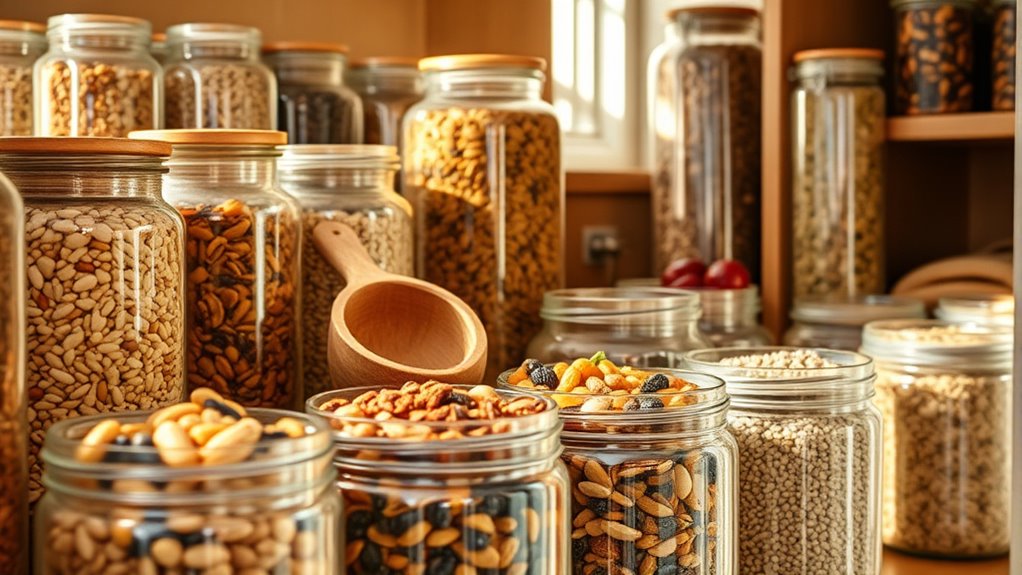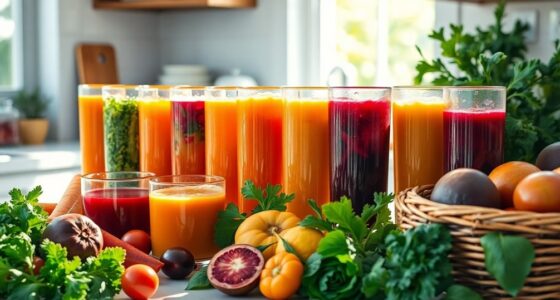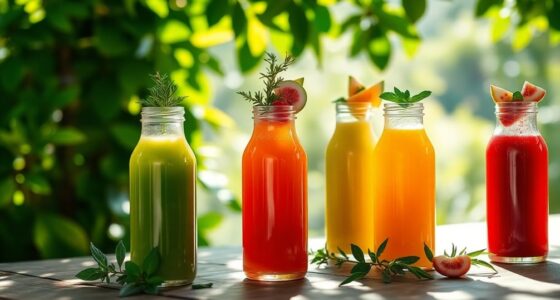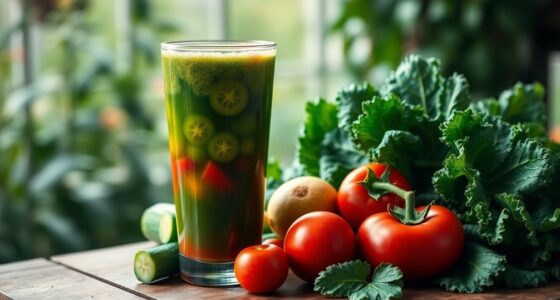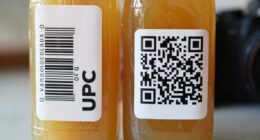Buying organic in bulk can save you money through better prices and discounts, while also reducing packaging waste. To keep your products fresh and prevent spoilage, invest in airtight, clear containers and use proper storage solutions like vacuum sealers or crisper drawers. Planning your shopping around sales and comparing prices across sources can increase your savings. Mastering storage and shopping strategies helps you maximize your investment — keep going to discover more tips for successful bulk organic buying.
Key Takeaways
- Buying in bulk reduces cost per unit and offers greater savings on organic products.
- Proper storage solutions like airtight containers and vacuum sealers extend freshness and prevent spoilage.
- Comparing prices at co-ops, farmers’ markets, and online helps maximize savings.
- Investing in quality storage equipment minimizes waste and maintains product quality over time.
- Planning shopping around sales and discounts enhances overall cost-effectiveness of bulk organic buying.
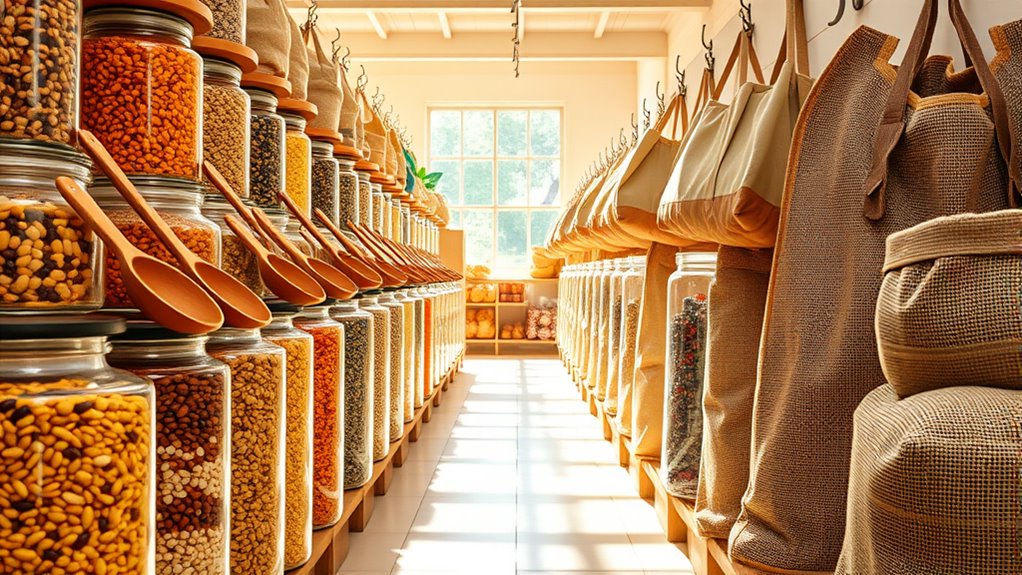
Buying organic in bulk is a smart way to save money while making healthier choices for yourself and the environment. When you opt for bulk organic products, you often benefit from better pricing strategies that reduce the cost per unit. Retailers and farmers sometimes offer discounts for larger quantities, which means you get more organic food for less money. This approach not only helps you stay within your budget but also encourages you to buy in larger amounts, minimizing packaging waste. To maximize savings, look for stores that have clear pricing strategies—some may brand certain bulk items as “value packs” or “specials,” giving you even better deals for buying in bulk.
Buying organic in bulk saves money, reduces waste, and offers better deals through smart pricing strategies.
However, before you start filling your cart, it’s essential to think about storage solutions. Organic products, especially grains, nuts, and dried fruits, need proper containment to stay fresh and prevent spoilage. Investing in airtight containers is a smart move; they help preserve the quality of your bulk items and keep pests out. Clear containers also let you see what’s inside, making it easier to organize your pantry and monitor stock levels. For perishables like fresh organic produce, consider using vacuum sealers or dedicated refrigerator crisper drawers to extend their freshness. Proper storage solutions guarantee that your bulk organic purchases don’t go to waste, saving you money in the long run.
Pricing strategies can vary depending on where you shop. Some stores have loyalty programs or membership discounts that cut costs further. Others might offer seasonal sales on organic bulk items, especially during harvest times or promotional events. It pays to compare prices between different suppliers—co-ops, farmers’ markets, and online bulk suppliers may all have varying deals. By staying informed about pricing strategies, you can plan your shopping trips around the best deals and stock up when prices are low. Additionally, understanding the data transfer rates of your shopping sources, like online stores, can help you choose platforms that offer faster and more reliable transactions.
When it comes to storage solutions, it’s worth investing upfront to save later. Good storage equipment can transform your bulk buying experience, making it easier to manage large quantities without clutter or waste. Keep in mind that the initial cost of storage containers or preservation tools can be offset by the savings you gain from buying in bulk at lower prices. Plus, having a well-organized pantry encourages you to use what you buy, reducing the risk of spoilage and ensuring you get the most value out of your investment.
Frequently Asked Questions
How Do I Determine the Shelf Life of Bulk Organic Products?
You can determine the shelf life of bulk organic products by checking their packaging for expiration dates and storage instructions, which rely on accurate labeling. Look for products with organic certification that guarantees quality standards. Proper storage in airtight containers and cool, dark places helps extend their freshness. Always inspect for signs of spoilage, and trust labels for guidance on how long your organic bulk items will stay fresh and safe to use.
Are There Specific Storage Containers Recommended for Organic Bulk Items?
When it comes to storing organic bulk items, you want containers that keep them fresh and protected. Reusable containers with airtight seals are your best bet—they prevent moisture and pests from sneaking in. Glass or BPA-free plastic containers are excellent choices. These containers help extend shelf life and maintain quality, so you’re not chasing after spoilage or waste. Invest in the right storage, and you’ll keep your organic goodies in tip-top shape.
How Can I Prevent Pest Infestation in Bulk Organic Storage?
To prevent pest infestations in your bulk organic storage, you should implement effective pest prevention measures. Use airtight containers to keep pests out, and store items in cool, dry locations to deter bugs. Regularly inspect your storage area for signs of pests, and clean shelves and containers frequently. Follow these storage tips to maintain freshness and protect your organic supplies from unwanted intruders.
What Are the Best Practices for Rotating Organic Bulk Stock?
Think of your organic stock as a ticking clock—you need to keep it moving to stay fresh. To master organic stock rotation, regularly check expiration dates and use the FIFO (First-In, First-Out) method. Store items in airtight containers, label them clearly, and keep a detailed inventory. These storage best practices guarantee your bulk organic products stay fresh longer, reducing waste and maximizing quality for every use.
Is There a Difference in Cost Between Organic and Non-Organic Bulk Items?
Yes, there’s often a difference in cost between organic and non-organic bulk items. You should do a price comparison because organic options tend to be more expensive due to quality differences and farming practices. While organic items cost more upfront, many find the better quality and health benefits worth the extra expense. Just remember to weigh these factors carefully to decide what fits your budget and priorities.
Conclusion
So, if you think buying organic in bulk is just saving a few bucks, think again! It’s like opening a treasure chest of freshness, flavor, and health perks that could transform your entire pantry into a paradise. With the right storage hacks, you’ll be able to keep your organic treasures fresher than ever—no more wasted food or missed opportunities. Immerse yourself, stock up, and watch your kitchen turn into a fortress of wholesome goodness!
Cindy thoroughly researches juicing trends, techniques, and recipes to provide readers with practical advice and inspiration. Her writing style is accessible, engaging, and designed to make complex concepts easy to understand. Cindy’s dedication to promoting the advantages of juicing shines through her work, empowering readers to make positive changes in their lives through the simple act of juicing.

